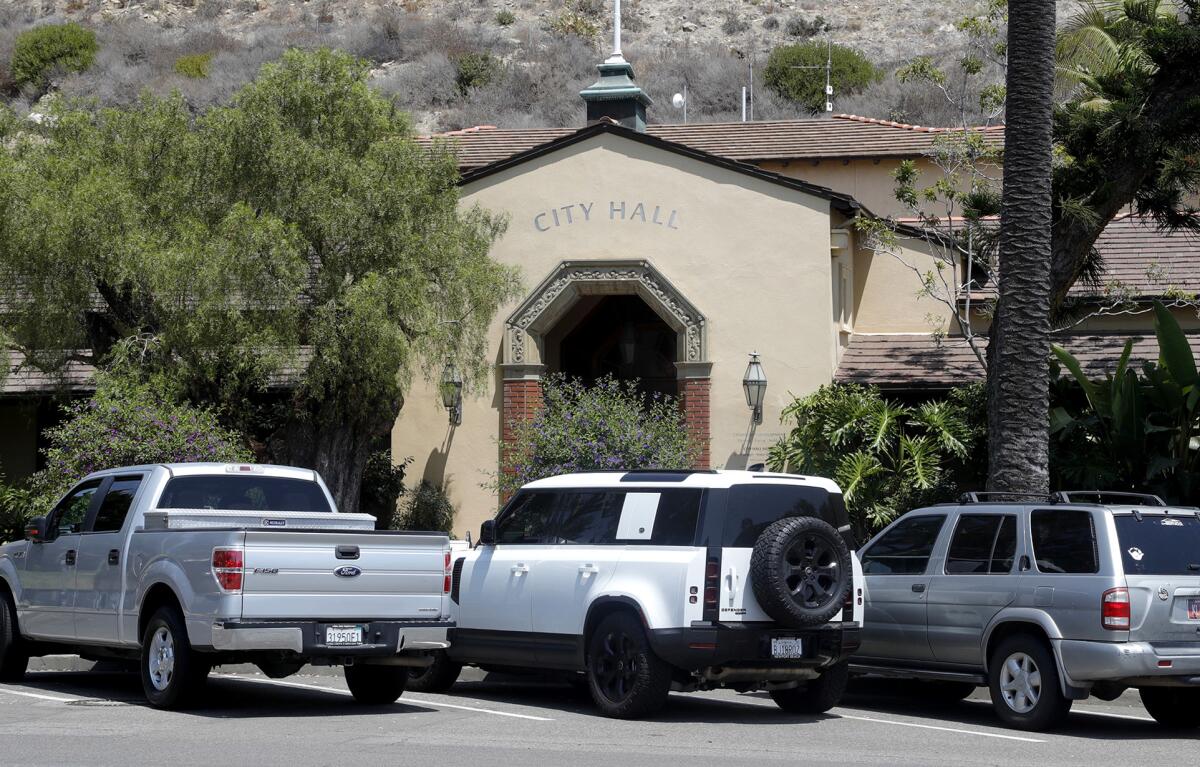Laguna Beach enters new fiscal year with $147-million budget

- Share via
Laguna Beach wrapped up its budget discussions with the City Council adopting a $147-million budget for operating and capital improvement costs on June 25 for the new fiscal year that began July 1.
There is an anticipated revenue of $93.8 million to the general fund, per a staff report, while proposed appropriations from the city’s primary operating fund amounted to $94.6 million.
The report noted the general fund remained balanced with a 20% reserve of $17.1 million.
Budgetary requests included $193,000 for a cybersecurity position, $500,000 for microgrid resiliency, and a $150,000 funding match of community donations to renovate the 1931 Seagrave fire engine.
Assistant City Manager Gavin Curran indicated the cybersecurity position could serve as a preventive measure to maintain access to critical resources, protecting the productivity of the city.
“The bad guys are always working to find ways around that, so you’re constantly trying to manage and add and change,” Curran said. “When you don’t have a dedicated person to do that, you can quickly fall behind. Fall[ing] behind is a risk. It’s a risk that you can accept, and that just means that you’re a little more vulnerable than you would be if you had the position.
“You have to remember that we’re a full-service city, so you’re dealing with police, fire, and not only just City Hall, so things and data we have to protect as best we can. We’ve been able to manage it with the staff we had, but it’s becoming more and more sophisticated — the services we have and what you need to provide to protect.”
Another $500,000 has been set aside in the Measure LL fund to provide for three additional firefighters. Fire Chief Niko King said during a meeting of the City Council on June 11 that the additional personnel would be placed at Fire Station No. 1.
“The fire chief did apply for a grant to fund these three firefighter positions, which the council did approve as the standards of cover,” Curran said. He noted that if the grant comes through there will be $500,00 available to add the firefighters, but that a strategic plan also needs to be put in place to implement other recommendations that would improve coverage.
In order to power the emergency operations center at the Laguna Beach Community and Recreation Center, a $100,000 expenditure was made on a portable generator.
A recurring theme in Laguna Beach is that more ways need to be found to have visitors contribute to the services being provided around town. The topic resurfaced with city officials considering the conversion of as many as 500 non-metered parking spaces to paid parking along Coast Highway in South Laguna.
Resident John Thomas suggested revisiting a business license fee for bars and restaurants, as well as a meal tax.
“The way to collect revenue from visitors to help cover more of the costs they create is through the bars and restaurants, where they are 80% of the customers,” Thomas said. “Structured properly, a small fee passed on to a large number of visitors could eventually generate nearly as much revenue for the city as the hotel tax, and the revenue would be collected from the correct visitors, the ones who generate most of the added costs.”
As for the potential for more paid parking along Coast Highway, city staff noted the process would include going through the California Coastal Commission. The conversion could result in an estimated $1.25 million in annual revenue once pay stations and signage were installed.
“I think parking in residential areas in any beach town is an issue you’re going to face,” said Michael Litschi, director of transit and community services. “People are looking for a place to park and get to the beach, so we’re hearing from residents that there’s parking issues right now in South Laguna without the meters in the neighborhoods.
“Sometimes, people will gravitate to areas that are designated as official parking places. If we did put meters in, we could also try to work with Caltrans to put parking sensors so they showed up and were shown as legitimate parking for people who were coming into town.”
Litschi also took questions on demand-based parking, sharing that the city was currently operating with a seasonal approach. Parking rates have risen to peak levels for the summer art festival season through Labor Day.
All the latest on Orange County from Orange County.
Get our free TimesOC newsletter.
You may occasionally receive promotional content from the Daily Pilot.






